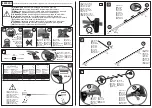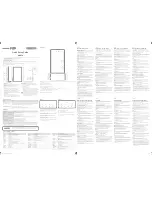
8
A = 2 - 3 mm
Al
1
2
B = 1 mm
C
1
2
3
6
4
4
1
2
5
5
7
A
B
C
D
EN //
OWNER’S MANUAL
STEM // PROD. CODE: 2285819
Preparing the handlebar for installation
1. Install the fork according to the manufacturer’s instructions and cut the steerer tube
down, if need be, by following the manufacturer’s instructions. The clamp side of the
steerer tube should have the following length:
• Forks with aluminium steerer: The steerer tube should be 2 mm to 3 mm shorter
than the top mounted component (fig. A/A).
• Forks with carbon steerer: The steerer tube should be 1 mm longer than the top of
the stem (fig. B/B.
2. Fit the star nut or steerer tube expander into the steerer tube according to the
manufacturer’s instructions. Do not install any star nuts into carbon steerer tubes!
3. Clean handlebar, steerer tube and stem. Make sure all clamping surfaces are clean
and free of grease! When using a carbon handlebar and/or carbon steerer tube,
apply some carbon friction paste to the clamping surfaces.
4. Loosen the steerer clamp bolts (fig. C/7) two turns.
5. Undo the handlebar clamp bolts (fig. C/5) and remove the handlebar clamps.
Installing the stem
1. Slide the stem onto the steerer tube so that it has a negative angle and points
straight into the direction of travel.
2. On forks with carbon steerer tube: Slide a spacer (fig. B/3) with a height of at least
5 mm on the steerer.
3. Put the top cap (fig. A, B, C /2) on the stem and tighten the headset adjustment bolt
(fig. A, B, C /1) down all the way, but leave it loose.
4. Install handlebar and handlebar clamps and tighten the clamp bolts (fig. C/4) just
enough so that the bar can still be moved.
→
Make sure that the top and bottom gaps between the faceplate and stem
(fig. C/4) are equal.
5. Centre the bars and adjust them to the desired angle. Please note the handlebar
manufacturer’s instructions!
6. Tighten the lower handlebar clamp bolts (fig. C/5) equally a little bit at a time until
you’ve reached a torque of 5 to 6 Nm.
7. Adjust the headset play: Tighten the headset adjustment bolt (fig. A, B, C/1) until
there is no play in the headset. Please note the headset manufacturer’s instructions!
8. Tighten the bolts that attach the stem to the steerer tube (fig. C/7) equally a little bit
at a time until you’ve reached a torque of 5 to 6 Nm.
Maintenance and Care
Regular care and maintenance ensure high durability and reliability, as well as unlimited
functionality. ROSE Bikes recommends carrying out the following tasks:
• Check bolts for proper torque regularly and tighten them to the required torque, if
need be.
• Regularly clean the stem with a gentle cleaning agent. Pay attention to the notes
and recommendations for use printed on the respective cleaner.
• Regularly check the stem and bolts for damages like cracks, deformation and
corrosion and replace the stem, if need be.
This manual is additionally available as a pdf file on rosebikes.com/manuals.
General information / Safety
Please read this manual carefully before taking the first ride with your new stem and
make sure you understand everything. Keep this manual for future reference. If you sell
or give away your stem, please also include the owner’s manual.
A steerer shim adapter (item no.: 522566) allows the use of stems designed to fit steerer
tubes with an outer dimension (fig. C/6) of 28,6 mm (1 1/8”) on forks with a steerer tube
outer dimension (fig. C/6) of 25,4 mm (1”). The slot of the shim should face to the front
to prevent any damages to the steerer tube.
Intended use
The stem may only be used on paved roads, gravel paths and moderate trails with
jumps, steps and drops of up to 15 cm.
The stem may only be mounted with a negative angle.
If the stem is mounted on a bike with a Shimano shifting system, the junction (fig. D/8)
can be fixed in the stem (see also fig. D).
DANGER
Risk of accident due to improper installation or handling of the stem!
A proper installation and handling of the stem significantly contributes to the safety of
your bike. Please note the following points:
• The stem may only be used for its intended purpose. Any other use may lead to
fatal accidents!
• The stem must only be installed by people with sufficient expertise and knowledge.
If in doubt, please consult a qualified bicycle mechanic!
• Make sure to tighten all screws to the required torque and additionally check the
manual of the handlebar or fork manufacturer for any deviations! Especially when
using carbon handlebars or forks with a carbon steerer, the torque indicated by the
manufacturers might be significantly lower.
• After a fall, the stem might have damages that are not externally visible. Ask a
qualified bicycle mechanic to check or – if need be – replace the stem after a fall!
• Aluminium stems must be replaced after 2 years or 10 000 km, whichever comes
first.
• In case of cracking noises or external damages like cracks, deformations or
discolorations, the stem must be replaced or serviced by a qualified bicycle
mechanic.






















